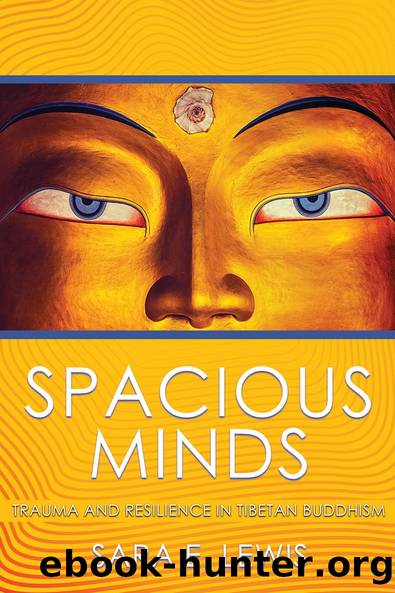Spacious Minds by Sara E. Lewis

Author:Sara E. Lewis [Lewis, Sara E.]
Language: eng
Format: epub
Tags: Social Science, Anthropology, Cultural & Social, History, Asia, Central Asia, Religion, Buddhism, Tibetan
ISBN: 9781501712203
Google: ro6PDwAAQBAJ
Publisher: Cornell University Press
Published: 2020-02-15T03:29:29+00:00
Past Is Past
The commonly used phrase âpast is pastâ is a pith aphorism that indexes the cultural wisdom and skillful approach to managing difficult emotions that I described in this chapter. For on the ultimate level, every event, and even the person experiencing the event, is in reality, illusory and empty of inherent existence. This ultimate view may seem bewildering to outsidersâhow would such a view promote resilience? And yet this view helps Tibetans in Dharamsala to experience and think about memory as plastic, fluid, and flexible. This orientation is highly pragmatic in that trying to solidify past events is an unreliable way to find contentment, particularly insofar as it churns up shenpa, the âjuiceâ of the emotions and ego clinging. Instead of debriefing and sharing stories, or even launching public truth commissions (which seem to bring about healing in other cultural contexts), Tibetans in Dharamsala strive for freedom from fixation.
And yet this story of resilience and recovery in Dharamsala would not be complete without examining an intriguing paradox with which the community must wrestle, namely, that âpast is pastâ will not fuel a human rights campaign. Based on Buddhist sensibilities of what one ought to do in the face of suffering, Tibetans tend to reflect on how all living beings are suffering, on how suffering can be used to generate compassion, and ultimately, on how we should resist taking ourselves and our problems too seriously. And yetâsuch interior maneuvers that promote resolution and acceptance do not produce narratives that strengthen collective claims of human rights abuses and oppression. Indeed, Tibetan activists worry that signs of strength, resilience, and recovery may weaken their political campaign. In the next chapter, I explore this paradox and suggest that rather than attempting to resolve this contradiction, Tibetans in exile employ a flexible stance, which promotes inner resolution through sems pa chen po, while simultaneously insisting that they are a vulnerable population in need. Rather than becoming postcolonial victims of Western trauma concepts, Tibetan political activists have appropriated foreign ideas and fashioned them not for psychological healingâindeed, they reject foreign mental health servicesâbut as a political device to fuel their human rights campaign. With a keen awareness of how evidence of chronic and intractable suffering provides legitimacy on the global stage, Tibetan activists have revamped local sensibilities of âtelling traumaâ by encouraging their countrymates to disseminate their stories of violence to the world.
Download
This site does not store any files on its server. We only index and link to content provided by other sites. Please contact the content providers to delete copyright contents if any and email us, we'll remove relevant links or contents immediately.
| Africa | Americas |
| Arctic & Antarctica | Asia |
| Australia & Oceania | Europe |
| Middle East | Russia |
| United States | World |
| Ancient Civilizations | Military |
| Historical Study & Educational Resources |
The Sympathizer by Viet Thanh Nguyen(4370)
The Rape of Nanking by Iris Chang(4189)
World without end by Ken Follett(3456)
Ants Among Elephants by Sujatha Gidla(3449)
Blood and Sand by Alex Von Tunzelmann(3180)
Japanese Design by Patricia J. Graham(3150)
The Queen of Nothing by Holly Black(2573)
City of Djinns: a year in Delhi by William Dalrymple(2542)
Foreign Devils on the Silk Road: The Search for the Lost Treasures of Central Asia by Peter Hopkirk(2451)
India's Ancient Past by R.S. Sharma(2438)
Inglorious Empire by Shashi Tharoor(2421)
Tokyo by Rob Goss(2416)
In Order to Live: A North Korean Girl's Journey to Freedom by Yeonmi Park(2369)
Tokyo Geek's Guide: Manga, Anime, Gaming, Cosplay, Toys, Idols & More - The Ultimate Guide to Japan's Otaku Culture by Simone Gianni(2352)
India's biggest cover-up by Dhar Anuj(2341)
The Great Game: On Secret Service in High Asia by Peter Hopkirk(2324)
Goodbye Madame Butterfly(2241)
Batik by Rudolf Smend(2165)
Living Silence in Burma by Christina Fink(2052)
